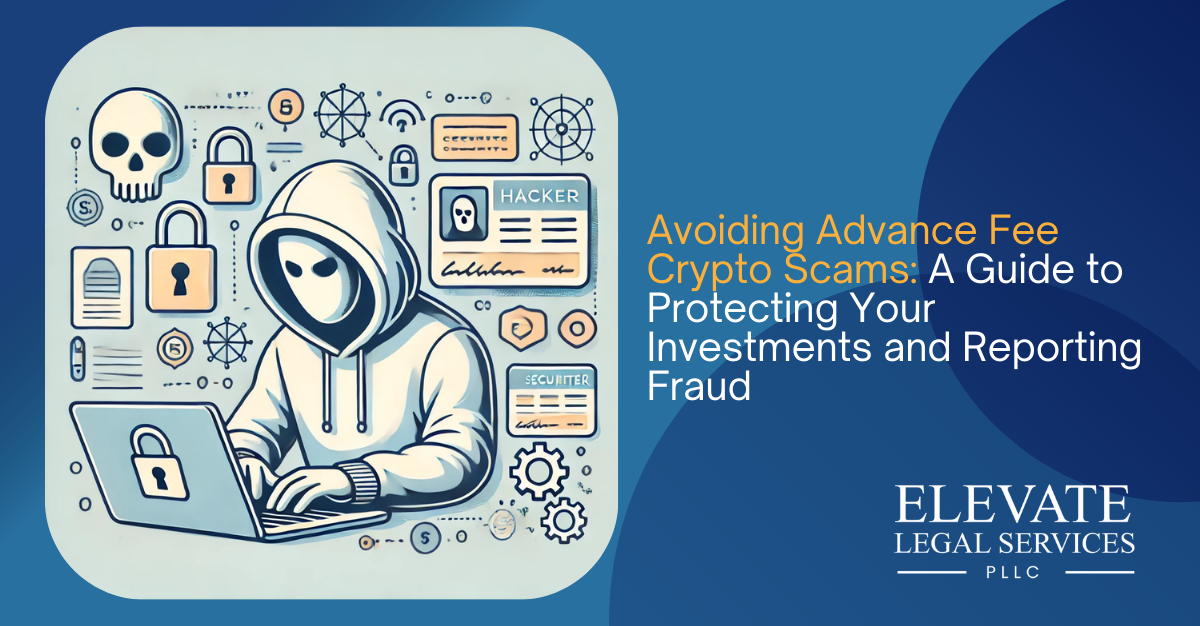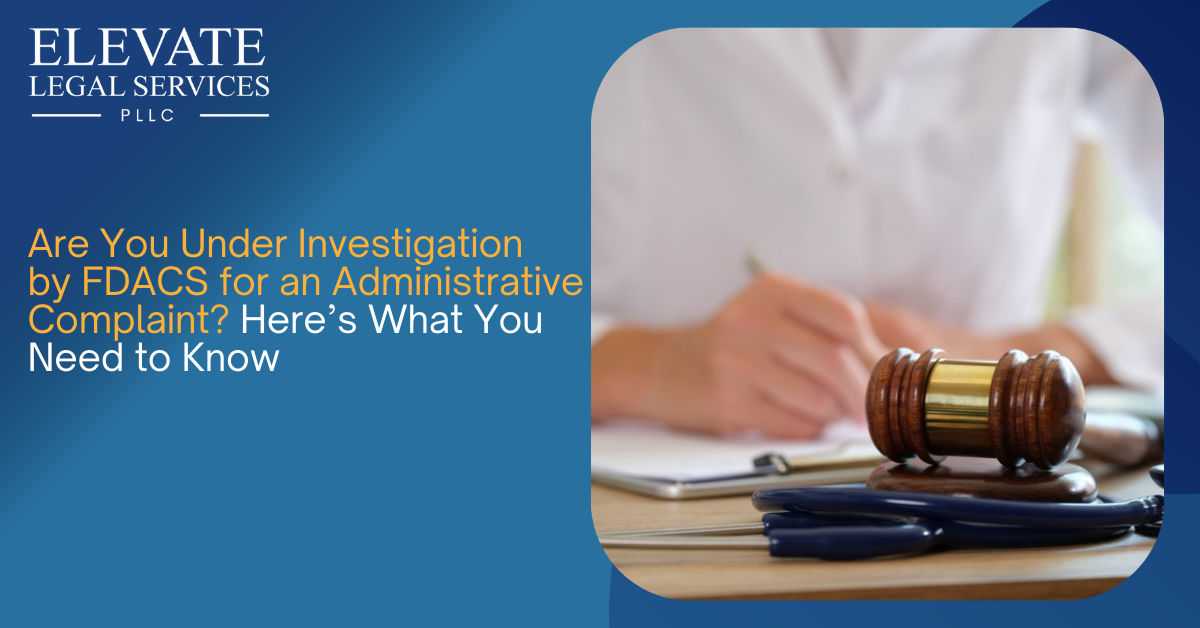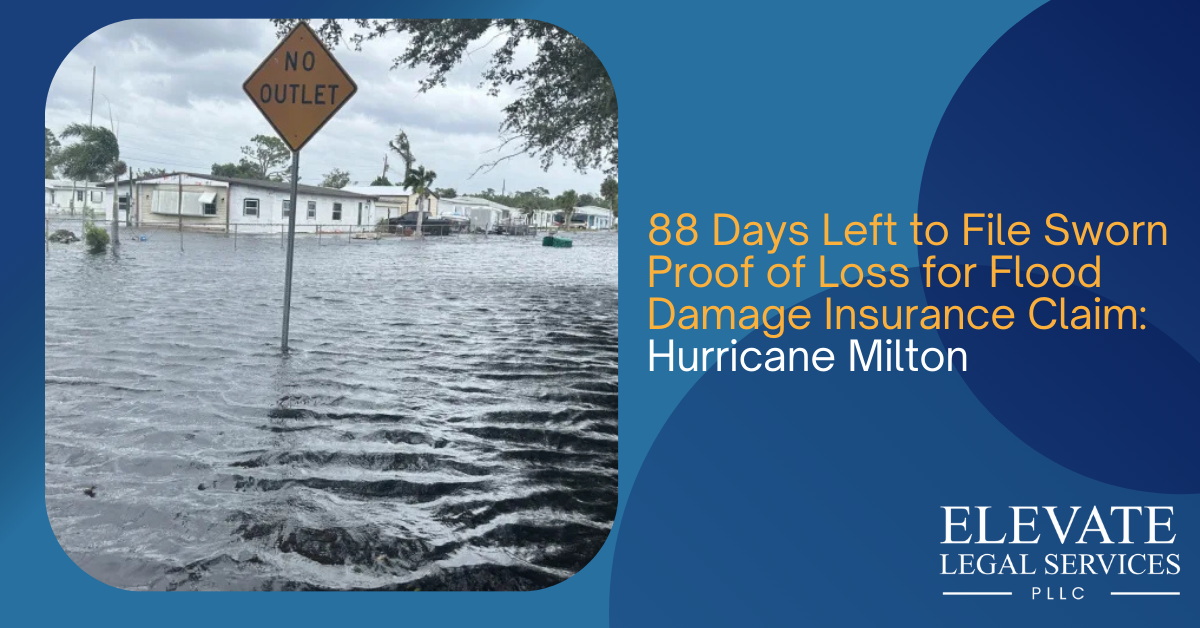
The rise of cryptocurrency has revolutionized finance, but it has also created fertile ground for scams, particularly “advance fee” schemes. These scams promise high returns or recovery of lost assets in exchange for an upfront fee, only for fraudsters to disappear once the payment is made. The SEC has highlighted the prevalence of these scams, emphasizing the need for heightened vigilance among crypto investors. Below, we’ll cover the basics of advance fee crypto scam, common tactics used, steps for victims, and guidance on reporting these scams to authorities to safeguard your investments. Contact Elevate Legal Services PLLC today to learn more about avoiding advance fee crypto scam.
Crypto fraud attorney Jay Arnesen chases down and exposes bad actors to recover lost or stolen crypto investments. In some cases, crypto investors who have been defrauded may be able to recover up to 30% of sanctions issued by government agencies like the Securities and Exchange Commission (SEC). Attorney Jay Arnesen, who is the CEO and Managing Partner of Elevate Legal Services, PLLC, has built an entire legal and cyber team to combat crypto crimes and recover lost or stolen crypto assets. He is at the forefront of a massive global cyber theft pandemic and uses cutting-edge technology and techniques to track and recover cryptocurrency all over the world.
1. Understanding Advance Fee Fraud in the Crypto Space
Advance fee fraud involves promises of large returns or asset recovery in exchange for a preliminary fee. Understanding this concept is crucial as it empowers you to identify potential scams. Fraudsters often claim to offer exclusive investment opportunities with guaranteed returns or retrieval of lost assets for a fee. The anonymous and decentralized nature of cryptocurrency transactions makes it easier for scammers to remain undetected, resulting in a surge in these schemes.
The SEC’s Investor Alert is a testament to the rise of advance fee scams in crypto markets, urging investors to be cautious. The SEC, along with other regulatory bodies, plays a crucial role in monitoring and regulating the crypto market, and they often issue warnings and guidelines to protect investors. Notably, these scams frequently target those who have already lost money in previous investments, offering a chance at recovery—if they pay an upfront fee. Once these fees are paid, scammers vanish, leaving victims in further financial distress.
2. Common Tactics Used in Advance Fee Crypto Scams
Fraudsters use a variety of methods to lure investors into advance fee scams, including:
- Fake Loan Offers: Scammers pose as lenders offering high-value crypto loans, requiring an upfront fee to secure funds.
- Fraudulent Investment Opportunities: They present “exclusive” investment opportunities promising high returns, claiming fees are necessary for “administrative” services.
- Recovery Scams: One of the most common tactics involves fraudsters claiming they can recover lost crypto assets in exchange for an upfront fee.
Warning Signs of Advance Fee Scams
 Being aware of red flags is crucial for avoiding scams:
Being aware of red flags is crucial for avoiding scams:
- High-pressure tactics: Scammers may push victims to act quickly, claiming the opportunity is limited.
- Guaranteed returns: Any promise of guaranteed profits is a red flag in the volatile crypto market.
- Unusual payment requests: Requests for payment in cryptocurrency or untraceable methods are common scam indicators.
- Lack of transparency: Scammers often avoid providing detailed information about their operations or past results.
If you encounter any of these signs, it’s crucial to be alert and cautious. Proceed with caution, conduct thorough research, and consult trusted professionals. Your vigilance can be the key to avoiding potential scams.
3. Steps for Victims of Advance Fee Fraud
If you believe you have been scammed, it’s essential to act quickly:
- Document all communications: Save all emails, messages, and transaction records as evidence.
- Stop further payments: Avoid additional fees, as these are often attempts to extort further funds.
- Preserve transaction evidence: Keep records of all transactions, including wallet addresses, timestamps, and amounts involved.
4. How to Report Crypto Advance Fee Fraud to Federal Law Enforcement
Federal agencies have dedicated channels for reporting crypto-related scams. Reporting incidents helps your case and supports broader efforts to combat crypto fraud. Here’s how to report:
- SEC (Securities and Exchange Commission): If your case involves securities fraud or deceptive investment claims, report it at www.sec.gov.
- CFTC (Commodity Futures Trading Commission): For scams involving crypto derivatives or commodities, file a report with the CFTC.
- FBI’s Internet Crime Complaint Center (IC3): The FBI’s IC3 portal (www.ic3.gov) accepts reports for online fraud, including crypto scams.
- Federal Trade Commission (FTC): The FTC’s complaint portal also accepts reports of scams and fraudulent activities.
Working with a law firm experienced in crypto fraud can streamline this process, ensuring that relevant details are provided to increase the likelihood of a thorough investigation.
5. International Reporting Channels and Cross-Border Considerations
Crypto scams are often cross-border, making international reporting crucial. Key international channels include:
- Europol: Victims in Europe can report crypto-related frauds to Europol, the EU’s law enforcement agency.
- INTERPOL: INTERPOL coordinates cross-border efforts to tackle crypto crimes internationally.
- Local Authorities in Relevant Jurisdictions: Filing reports in the country where the fraud originated can add jurisdictional leverage to investigations.
Elevate Legal Services, PLLC’s international expertise, helps clients navigate cross-border legal complexities, ensuring thorough reporting no matter where the scam originated. Reporting in the country where the fraud originated can provide ‘jurisdictional leverage’, which means it can give the authorities in that country more power to investigate and prosecute the fraudsters.
6. Protecting Yourself from Advance Fee Crypto Scam: Prevention Tips
 Prevention is the best strategy against advance fee scams. Here are some practical steps:
Prevention is the best strategy against advance fee scams. Here are some practical steps:
- Conduct Thorough Research: Investigate any platform or individual offering investment services and verify their legitimacy through official channels.
- Verify Legitimacy: Contact the organization directly to confirm any communication received.
- Consult Trusted Advisors: Discuss potential investments with financial advisors, legal experts, or even trusted friends or family members who are knowledgeable about cryptocurrencies before committing funds.
- Beware of High-Pressure Tactics: If you feel rushed to make a quick decision, it’s often a scam tactic—take a step back.
- Confirm Payment Methods: Legitimate businesses typically offer traceable payment options; be wary of requests for untraceable payment methods like crypto.
7. Conclusion: Why Legal Support Is Essential In Combating Crypto Fraud
Advance fee crypto scams are on the rise, making vigilance and professional support critical. Reporting fraud not only helps your case but also aids in cracking down on similar schemes. Legal guidance can be invaluable, from gathering evidence to liaising with both federal and international agencies.
At Elevate Legal Services, PLLC, we’re dedicated to helping victims of crypto fraud by offering our expertise, resources, and support through the reporting and recovery process. If you’ve been affected by a scam or need assistance in protecting your investments, contact us today at 561-770-3335 or [email protected]. Taking action now can make all the difference in securing your financial future and bringing fraudsters to justice.






